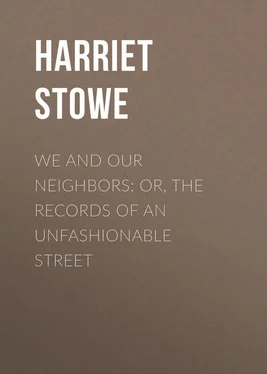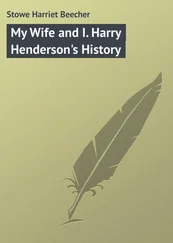Harriet Stowe - We and Our Neighbors - or, The Records of an Unfashionable Street
Здесь есть возможность читать онлайн «Harriet Stowe - We and Our Neighbors - or, The Records of an Unfashionable Street» — ознакомительный отрывок электронной книги совершенно бесплатно, а после прочтения отрывка купить полную версию. В некоторых случаях можно слушать аудио, скачать через торрент в формате fb2 и присутствует краткое содержание. ISBN: , Жанр: foreign_prose, на английском языке. Описание произведения, (предисловие) а так же отзывы посетителей доступны на портале библиотеки ЛибКат.
- Название:We and Our Neighbors: or, The Records of an Unfashionable Street
- Автор:
- Жанр:
- Год:неизвестен
- ISBN:http://www.gutenberg.org/ebooks/48603
- Рейтинг книги:4 / 5. Голосов: 1
-
Избранное:Добавить в избранное
- Отзывы:
-
Ваша оценка:
- 80
- 1
- 2
- 3
- 4
- 5
We and Our Neighbors: or, The Records of an Unfashionable Street: краткое содержание, описание и аннотация
Предлагаем к чтению аннотацию, описание, краткое содержание или предисловие (зависит от того, что написал сам автор книги «We and Our Neighbors: or, The Records of an Unfashionable Street»). Если вы не нашли необходимую информацию о книге — напишите в комментариях, мы постараемся отыскать её.
We and Our Neighbors: or, The Records of an Unfashionable Street — читать онлайн ознакомительный отрывок
Ниже представлен текст книги, разбитый по страницам. Система сохранения места последней прочитанной страницы, позволяет с удобством читать онлайн бесплатно книгу «We and Our Neighbors: or, The Records of an Unfashionable Street», без необходимости каждый раз заново искать на чём Вы остановились. Поставьте закладку, и сможете в любой момент перейти на страницу, на которой закончили чтение.
Интервал:
Закладка:
"Oh, Jim, you mustn't talk so. Why, you really shock me – you grieve me."
"Well, you see, I've given up swearing for ever so long, but some kinds of people do tempt me fearfully, and he's one of 'em, and then I think that he must think I'm a wolf in sheep's clothing. But then, you see, a wolf understands those cubs better than a sheep. You ought to hear how I put gospel into them. I make 'em come out on the responses like little Trojans. I've promised every boy who is 'sharp up' on his Collect next Sunday a new pop-gun."
"O Jim, you creature!" said Alice, laughing.
"By George, Alice, it's the best way. You don't know anything about these little heathen. You've got to take 'em where they live. They put up with the Collect for the sake of the pop-gun, you see."
"But, Jim, I really was in hopes that you would look on this thing seriously," said Alice, endeavoring to draw on a face of protest.
"Why, Alice, I am serious; didn't I go round to the highways and hedges, drumming up those little varmints? Not a soul of them would have put his head inside a Sunday-school room if it hadn't been for me. I tell you I ought to be encouraged now. I'm not appreciated."
"Oh Jim, you have done beautifully."
"I should think I had. I keep a long face while they are there, and don't swear at Mr. St. John, and sing like a church robin. So I think you ought to let me let out a little to you going home. That eases my mind; it's the confessional – Mr. St. John believes in that. I didn't swear, mind you. I only felt like it; maybe that'll wear off, by-and-by. So don't give me up, yet."
"Oh, I don't; and I'm perfectly sure, Jim, that you are the very person that can do good to these wild boys. Of course the free experience of life which young men have, enables them to know how to deal with such cases better than we girls can."
"Yes, you ought to hear me expound the commandments, and put it into them about stealing and lying. You see Jim knows a thing or two, and is up to their tricks. They don't come it round Jim, I tell you. Any boy that don't toe the crack gets it. I give 'em C sharp with the key up."
"O Jim, you certainly are original in your ways! But I dare say you're right," said Alice. "You know how to get on with them."
"Indeed I do. I tell you I know what's what for these boys, though I don't know, and don't care about, what the old coves did in the first two centuries, and all that. Don't you think, Alice, St. John is a little prosy on that chapter?"
"Mr. St. John is such a good man that I receive everything he says on subjects where he knows more than I do," said Alice, virtuously.
"Oh pshaw, Alice! If a fellow has to swallow every good man's hobby-horses, hoofs, tail and all, why he'll have a good deal to digest. I tell you St. John is too 'other-worldly,' as Charles Lamb used to say. He ought to get in love, and get married. I think, now, that if our little Angie would take him in hand she would bring him into mortal spheres, make a nice fellow of him."
"Oh, Mr. St. John never will marry," said Alice, solemnly; "he is devoted to the church. He has published a tract on holy virginity that is beautiful."
"Holy grandmother!" said Jim; "that's all bosh, Ally. Now you are too sensible a girl to talk that way. That's going to Rome on a high canter."
"I don't think so," said Alice, stoutly. "For my part, I think if a man, for the sake of devoting himself to the church, gives up family cares, I reverence him. I like to feel that my rector is something sacred to the altar. The very idea of a clergyman in any other than sacred relations is disagreeable to me."
"Go it, now! So long as I'm not the clergyman!"
"You sauce-box!"
"Well, now, mark my words. St. John is a man, after all, and not a Fra Angelico angel, with a long neck and a lily in his hand, and, I tell you, when Angie sits there at the head of her class, working and fussing over those girls, she looks confoundedly pretty, and if St. John finds it out I shall think the better of him, and I think he will.
"Pshaw, Jim, he never looks at her."
"Don't he? He does though. I've seen him go round and round, and look at her as if she was an electrical battery, or something that he was afraid might go off and kill him. But he does look at her. I tell you, Jim knows the signs of the sky."
With which edifying preparation of mind, Alice found herself at the door of the Sunday-school room, where the pair were graciously received by Mr. St. John.
CHAPTER X
MR. ST. JOHN
That good man, in the calm innocence of his heart, was ignorant of the temptations to which he exposed his tumultuous young disciple. He was serenely gratified with the sight of Jim's handsome face and alert, active figure, as he was enacting good shepherd over his unruly flock. Had he known the exact nature of the motives which he presented to lead them to walk in the ways of piety, he might have searched a good while in primitive records before finding a churchly precedent.
Arthur St. John was by nature a poet and idealist He was as pure as a chrysolite, as refined as a flower; and, being thus, had been, by the irony of fate, born on one of the bleakest hillsides of New Hampshire, where there was a literal famine of any esthetic food. His childhood had been fed on the dry husks of doctrinal catechism; he had sat wearily on hard high-backed seats and dangled his little legs hopelessly through sermons on the difference between justification and sanctification. His ultra-morbid conscientiousness had been wrought into agonized convulsions by stringent endeavors to carry him through certain prescribed formulæ of conviction of sin and conversion; efforts which, grating against natures of a certain delicate fiber, produce wounds and abrasions which no after-life can heal. To such a one the cool shades of the Episcopal Church, with its orderly ways, its poetic liturgy, its artistic ceremonies, were as the shadow of a great rock in a weary land. No converts are so disposed to be ultra as converts by reaction; and persons of a poetic and imaginative temperament are peculiarly liable to these extremes.
Wearied with the intense and noisy clangor of modern thought, it was not strange if he should come to think free inquiry an evil, look longingly back on the ages of simple credulity, and believe that the dark ages of intellect were the bright ones of faith. Without really going over to the Romish Church, he proposed to walk that path, fine as the blade that Mahomet fabled as the Bridge of Paradise, in which he might secure all the powers and influences and advantages of that old system without its defects and corruptions.
So he had established his mission in one of the least hopeful neighborhoods of New York. The chapel was a marvel of beauty and taste at small expense, for St. John was in a certain way an ecclesiastical architect and artist. He could illuminate neatly, and had at command a good store of the beautiful forms of the past to choose from. He worked at diaphanous windows which had all the effect of painted glass, and emblazoned texts and legends, and painted in polychrome, till the little chapel dazzled the eyes of street vagabonds, who never before had been made welcome to so pretty a place in their lives. Then, when he impressed it on the minds of these poor people that this lovely, pretty little church was their Father's house, freely open to them every day, and that prayers and psalms might be heard there morning and evening, and the holy communion of Christ's love every Sunday, it is no marvel if many were drawn in and impressed. Beauty of form and attractiveness of color in the church arrangements of the rich may cease to be means of grace and become wantonness of luxury – but for the very poor they are an education, they are means of quickening the artistic sense, which is twin brother to the spiritual. The rich do not need these things, and the poor do.
Читать дальшеИнтервал:
Закладка:
Похожие книги на «We and Our Neighbors: or, The Records of an Unfashionable Street»
Представляем Вашему вниманию похожие книги на «We and Our Neighbors: or, The Records of an Unfashionable Street» списком для выбора. Мы отобрали схожую по названию и смыслу литературу в надежде предоставить читателям больше вариантов отыскать новые, интересные, ещё непрочитанные произведения.
Обсуждение, отзывы о книге «We and Our Neighbors: or, The Records of an Unfashionable Street» и просто собственные мнения читателей. Оставьте ваши комментарии, напишите, что Вы думаете о произведении, его смысле или главных героях. Укажите что конкретно понравилось, а что нет, и почему Вы так считаете.












